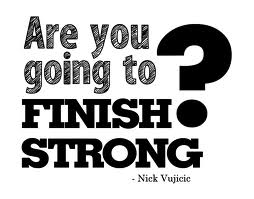It's Spring, a time when most of us feel a sense of
renewed energy, hope and optimism. But, this year, Spring brings with it mixed
emotions and concern about the days
ahead. Why because we are tasked daily with “change.” We pause with concern and
after a moment we think, “I’m okay; I still have time to make changes” and we
go about the rest of our day. But…how do
you finish?
Finishing strong helps you
leave well. You will only get one chance to finish well in this position then
history will decide how you are remembered. When you keep your eye on the
finish line, you stay focused on doing your best right up until the end. Success
isn’t about starting but finishing. The end of the quarter
brings some questions with it:
“Was it worth it?”
“Did I really make a difference?”
“What kind of effort can I honestly put into this thing in the last few days?”
“Did I really make a difference?”
“What kind of effort can I honestly put into this thing in the last few days?”
These types of questions can conjure up feelings of regret over
what you expected to happen and where you’re currently at. They can also
motivate you to make the most of the moments you have left to serve.
It all depends on where your
focus is: regret or resolve.
The difficulty with regret
is that it comes with the realization that you can’t go back and change
what has already happened. The beauty of resolve is that it doesn’t matter
what’s happened in the past, you can keep your eyes focused on where you’re
headed in the present. You can experience a breakthrough in your leadership
when you’re able to focus and concentrate on those areas where you can lend
your strengths.
When you finish strong, it
serves as a model for yourself, your team, your division, your company. This isn't just about you, but about all of the people whom you lead. A
successful ending should be a team effort. Work to keep yourself engaged,
motivated, and connected to the goals and vision of the team right up to the
end. Nothing will deflate team morale more than to have members of a team
slowly fade away before the quarter is up. Sales is a team sport!
The difference between a
leader and a follower is found in the willingness one has to accept
responsibility. You may have some “good reasons” for shirking your
responsibilities as it gets close to the end. But you only miss out on the
sense of satisfaction and personal pride of seeing your responsibility through
to the end.
If you've read all the way to this point, you probably realize
that finishing strong is a principle that you need to follow in everything you
do. Do the hard work on the back end to see your commitments through.
The best piece of advice
you can take from all that I have said: “Don’t give up…finish strong!







